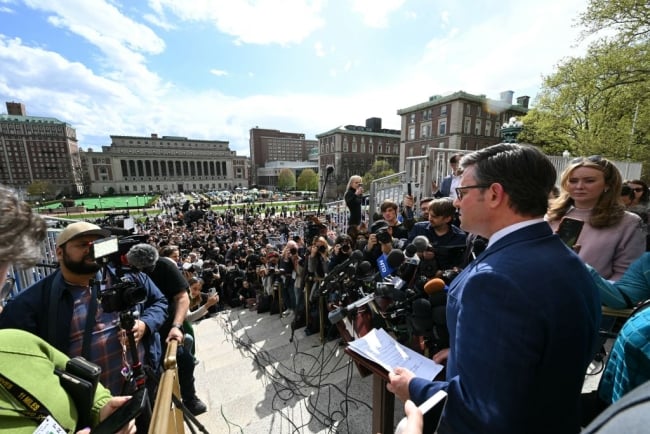You have /5 articles left.
Sign up for a free account or log in.

House Speaker Mike Johnson held a press conference on the steps of Columbia University’s Low Library Wednesday afternoon.
Timothy A. Clary/AFP via Getty Images
The crisis at Columbia University continues: on Wednesday afternoon, Republican Speaker of the House Mike Johnson arrived on campus and spoke to a crowd of hundreds from the steps of Low Memorial Library, overlooking an encampment set up by pro-Palestinian protesters.
“I’m here today, joining my colleagues, and calling on President Shafik to resign if she cannot immediately bring order to this chaos,” he said. “The madness has to stop.”
.@SpeakerJohnson at Columbia University: "I am here today joining my colleagues and calling on President Shafik to resign if she cannot immediately bring order to this chaos." pic.twitter.com/wcpYhiJeK8
— CSPAN (@cspan) April 24, 2024
He even raised the prospect of bringing in the National Guard, adding “We cannot allow this to happen around the country.”
Students heckled and booed Johnson in return, chanting phrases like “Mike, you suck!” and “Speak up, you piece of s***!”
His presence further incited a campus already on edge. Ever since President Minouche Shafik testified before Congress a week ago, she has been assailed by students, faculty and political leaders for her handling of pro-Palestinian protests on campus. The day after the hearing, she authorized New York City police to dismantle the encampment students had set up on the South Lawn; more than 100 protesters were arrested. But within days, students had rebuilt their tent city, this time to the west. Protesters on- and off-campus continued to agitate over the weekend. Just after midnight on Monday, Shafik announced all classes would be remote that day.
Since then, she has extended the change, requiring professors on the Morningside Heights campus to provide a remote option for all classes and exams until the academic year ends May 10—a move some critics have deemed a surrender to student demonstrators.
Meanwhile, the battle over the tents continues. In an email to the Columbia community Tuesday night, Shafik denounced the rebuilt encampment, saying that while she “fully support[s] the importance of free speech” and peaceful demonstrations, “the encampment raises serious safety concerns, disrupts campus life and has created a tense and at times hostile environment for many members of our community.”
“It is essential that we move forward with a plan to dismantle it,” she added.
The past 24 hours have revealed a glimmer of hope for detente between protesters and university leaders. Shafik sent another email in the wee hours of Wednesday morning, announcing that the student protesters had made some concessions: they committed to removing a significant number of tents, ensured non-Columbia students would leave and barred all harassment and discrimination.
“In light of this constructive dialogue, the university will continue conversations for the next 48 hours,” she wrote.
But plenty could still derail that progress, including the looming threat of National Guard deployment and a faculty censure vote of the president scheduled for Friday.
Mounting Criticism of Shafik
Rick Hess, director of education policy studies at the American Enterprise Institute, a conservative think tank, said that “Columbia has gone from a disaster zone to catastrophe,” since Shafik’s hearing on Capitol Hill last week.
While her responses before Congress were “better” than those of her former Ivy league peers at Harvard and Penn back in December, they felt slightly tone deaf, he said. “She looked like someone who had been programmed with the things to say to finally get these mean- spirited Republicans off our backs,” he added.
Hess also noted that while arresting student protesters was “an appropriate measure,” Shafik’s actions since the hearing haven’t been enough.
“The biggest concern among Republicans was that higher education exists … to promote teaching and learning and inquiry. And what you have seen is campuses taken over by performative thugs,” he said. “So the fact that the president would throw up their hands and abandon any pretense of real in-person education … shows nothing more than surrender in the face of chaos.”
Republican lawmakers have also called for the president to take immediate disciplinary action or step down.
.@virginiafoxx on @Columbia campus w/ @SpeakerJohnson:
— House Committee on Education & the Workforce (@EdWorkforceCmte) April 24, 2024
"President Shafik, the inmates are running the asylum. Take back control of this once-great institution."
Full remarks ⤵️ pic.twitter.com/u05zLl46wG
“I have a message for you, President Shafik,” Representative Virginia Foxx, Republican chair of the House Committee on Education and the Workforce, said Wednesday on Columbia’s campus. “The inmates are running the asylum. … You took action last week. It’s time to act again.”
Republican representative Elise Stefanik, who relentlessly questioned Shafik during last week’s hearing, demanded consequences not only for the president but also for the university itself. In a letter to three government agencies Tuesday, Stefanik declared that all federal funding for Columbia should be revoked.
Faculty and free speech groups have likewise criticized Shafik, but for different reasons.
“The arrests of students and faculty are a disproportionate and wrong-headed response to overwhelmingly peaceful campus events,” Irene Mulvey, president of the American Association of University Professors, said in a public statement Wednesday. “Summoning armed police officers in order to silence debate and suppress speech that poses no genuine threat to campus safety is a danger to democracy.”
PEN America and the Knight First Amendment Institute had a similar response.
“Student protests—a significant and long-standing feature of campus life—should be zealously protected, even when they are contentious,” PEN America said in a statement. “Balancing these essential responsibilities [protecting peaceful protest and disciplining antisemitism] is a daunting but necessary task.”
Karl Schonberg, a professor of government at St. Lawrence University, was among the few to speak in support of Shafik.
“[It’s] an incredibly difficult situation to manage because of the intensity of emotion on all sides and the competing cross-currents of pressure from different constituencies on campus, alumni and government,” he said. “It is hard to imagine a more difficult first year for any new college president than Dr. Shafik has had.”
He added that as long as the president and the board have acted appropriately and uphold the law and their policies, she should not resign.
The Columbia Board of Trustees concurred, announced Wednesday evening that it “strongly supports” Shafik.
“During the search process for this role, President Shafik told us that she would always take a thoughtful approach to resolving conflict, balancing the disparate voices that make up a vibrant campus like Columbia’s, while taking a firm stance against hatred, harassment and discrimination,” the board said in a statement. ”That’s exactly what she’s doing now.”
‘Everyone’s Been Affected’
Esha Karam, managing editor of the Columbia Daily Spectator, said she and her fellow journalists have heard a “wide variety of responses” from students regarding their frustrations with the administration.
“Since last Wednesday, we’ve seen a really heightened, tense time on campus and the effects of national scrutiny,” she said. “Some [students] are calling for increased security and NYPD presence on campus, and some are calling for less.” She even noted a diversity of perspective among Jewish student groups, some of which are directly involved in the pro-Palestinian protests.
“But, regardless of anyone’s involvement, everyone has really been affected, either academically or just by the climate on campus,” she added.
The campus itself has been transformed, too. The main lawn, usually in full commencement mode by this point of the year, looks different, Karam said. Although the east half of the lawn has been covered with artificial grass and bleachers in preparation for the May 15 graduation, the west half remains occupied by a city of tents.
While the president and outside commentators have raised concern regarding the clash between commencement goers and protesters, students don’t seem especially worried. After all, this year’s graduating class—who spent their entire first year remote due to the COVID-19 pandemic—are accustomed to a little disruption. And according to Karam, many are not inclined to let a diploma ceremony stand in the way of their activism.
“There are a contingent of seniors who are actively participating in the protests, and they’ve expressed that they’re committed to seeing this movement through,” she said.








